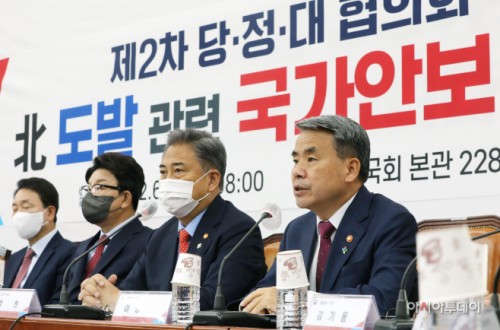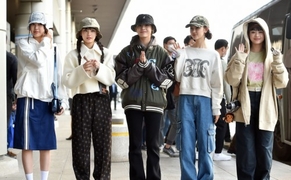 |
| Defense Minister Lee Jong-seop speaks at a consultative meeting on North Korea’s threats, among the ruling People Power Party, the presidential office and the government, held at the National Assembly on June 8, 2022./ Photographed by Lee Byung-hwa |
AsiaToday reporter Lee Seok-jong
The security situation on the Korean Peninsula is shaking amid reports that the North will conduct a nuclear test as early as this weekend, putting the new government’s diplomatic power with the United States and China to test.
Experts say Pyongyang’s possible seventh nuclear test is aimed at taking the lead in inter-Korean relations by taming the new government which was launched last month, and also bringing direct negotiations with Washington.
South Korea and the U.S. plan to impose individual sanctions against the North as well as additional UN Security Council sanctions if it conducts a nuclear test. However, additional sanctions at the UN Security Council level are unlikely as China and Russia are expected to exercise their veto rights.
However, China will not simply stand watching the situation since North Korea’s nuclear test would greatly affect the global economy and security situation. Attention is now focused on how China would influence North Korea.
In this situation, the Yoon Suk-yeol administration held a consultative meeting with officials from the ruling People Power Party (PPP), the government and the presidential office on North Korea’s threats, at the National Assembly on Wednesday. South Korea, the United States and Japan held a trilateral meeting of vice foreign ministers, urging North Korea to refrain from testing nuclear weapons. The three countries will also hold a trilateral meeting of defense ministers to seek a joint response plan.
According to South Korean and U.S. intelligence agencies and government sources, there are indications that one of the passages at the Punggye-ri testing ground in North Korea has been reopened, possibly in preparations for a nuclear test.
It indicates that the North is all but ready to conduct another nuclear test. “Considering various factors such as weather in Punggye-ri testing site and internal affairs, the North is likely to conduct its nuclear test on Friday,” a government source said. “The North is likely to carry out a nuclear test no later than June 20, when the rainy season begins.”
“North Korea appears to have completed preparations for a nuclear test that could take place at any time,” Special U.S. Representative for North Korea Sung Kim said Tuesday.
“The absence of North Korean leader Kim Jong-un at a ruling Workers’ Party politburo meeting held on Tuesday is probably due to the North’s seventh nuclear test preparation review,” said Chung Suong-jang, director of North Korea studies at the Sejong Institute.
In this situation, the government and the PPP agreed to neutralize the North Korean nuclear and missile threats by strengthening the country’s three-axis system, which consists of the Korea Massive Punishment and Retaliation, the Kill Chain preemptive strike platform, and the Korea Air and Missile Defense system.
“We cannot live with North Korea’s nuclear weapons on our heads,” said Shin In-ho, the second deputy national security adviser. “We will seek fundamental ways to neutralize the North’s nuclear and missile threats through our three-axis defense system within Yoon’s presidency.”
Defense Minister Lee Jong-seop said the security situation of the Korean Peninsula is “very grave” and that the country will maintain a tight readiness posture. “In order to respond to North Korea’s nuclear and missile threats, we will raise our execution power in regards to the U.S. extended deterrence commitment and strengthen our three-axis system.”
#North Korea #nuclear test #Yoon Suk-yeol
Copyright by Asiatoday
Most Read
-
1
-
2
-
3
-
4
-
5
-
6
-
7





















